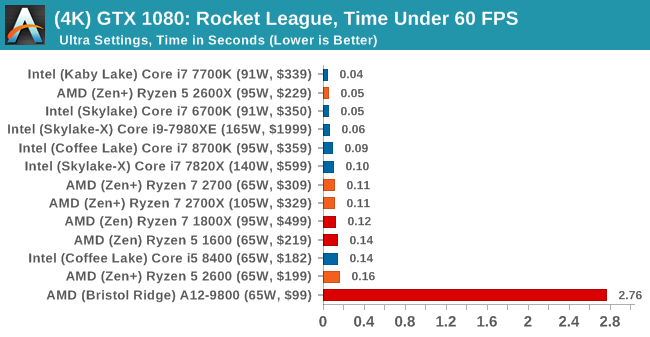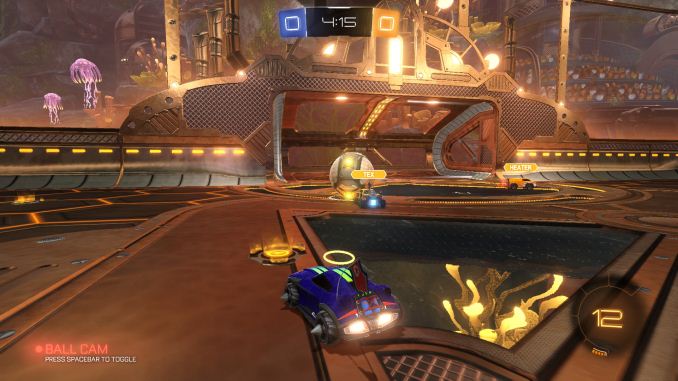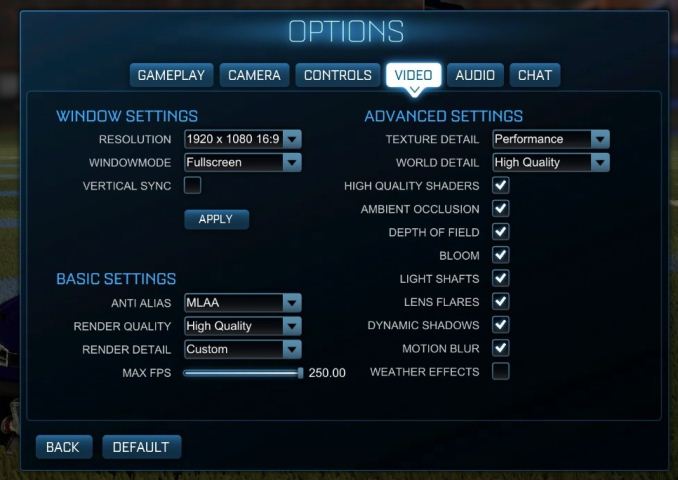The AMD 2nd Gen Ryzen Deep Dive: The 2700X, 2700, 2600X, and 2600 Tested
by Ian Cutress on April 19, 2018 9:00 AM ESTRocket League
Hilariously simple pick-up-and-play games are great fun. I'm a massive fan of the Katamari franchise for that reason — passing start on a controller and rolling around, picking up things to get bigger, is extremely simple. Until we get a PC version of Katamari that I can benchmark, we'll focus on Rocket League.
Rocket League combines the elements of pick-up-and-play, allowing users to jump into a game with other people (or bots) to play football with cars with zero rules. The title is built on Unreal Engine 3, which is somewhat old at this point, but it allows users to run the game on super-low-end systems while still taxing the big ones. Since the release in 2015, it has sold over 5 million copies and seems to be a fixture at LANs and game shows. Users who train get very serious, playing in teams and leagues with very few settings to configure, and everyone is on the same level. Rocket League is quickly becoming one of the favored titles for e-sports tournaments, especially when e-sports contests can be viewed directly from the game interface.
Based on these factors, plus the fact that it is an extremely fun title to load and play, we set out to find the best way to benchmark it. Unfortunately for the most part automatic benchmark modes for games are few and far between. Partly because of this, but also on the basis that it is built on the Unreal 3 engine, Rocket League does not have a benchmark mode. In this case, we have to develop a consistent run and record the frame rate.
Read our initial analysis on our Rocket League benchmark on low-end graphics here.
With Rocket League, there is no benchmark mode, so we have to perform a series of automated actions, similar to a racing game having a fixed number of laps. We take the following approach: Using Fraps to record the time taken to show each frame (and the overall frame rates), we use an automation tool to set up a consistent no-bot match on easy, with the system applying a series of inputs throughout the run, such as switching camera angles and driving around.
It turns out that this method is nicely indicative of a real match, driving up walls, boosting and even putting in the odd assist, save and/or goal, as weird as that sounds for an automated set of commands. To maintain consistency, the commands we apply are not random but time-fixed, and we also keep the map the same (Aquadome, known to be a tough map for GPUs due to water/transparency) and the car customization constant. We start recording just after a match starts, and record for 4 minutes of game time (think 5 laps of a DIRT: Rally benchmark), with average frame rates, 99th percentile and frame times all provided.
The graphics settings for Rocket League come in four broad, generic settings: Low, Medium, High and High FXAA. There are advanced settings in place for shadows and details; however, for these tests, we keep to the generic settings. For both 1920x1080 and 4K resolutions, we test at the High preset with an unlimited frame cap.
All of our benchmark results can also be found in our benchmark engine, Bench.
MSI GTX 1080 Gaming 8G Performance
1080p



4K
















545 Comments
View All Comments
jjj - Thursday, April 19, 2018 - link
I was wondering about gaming, so there is no mistake there as Ryzen 2 seems to top Intel.As of right now, I don't seem to find memory specs in the review yet, safe to assume you did as always, highest non-OC so Ryzen is using faster DRAM?
Also yet to spot memory letency, any chance you have some numbers at 3600MHz vs Intel? Thanks.
jjj - Thursday, April 19, 2018 - link
And just between us, would be nice to have some Vega gaming results under DX12.aliquis - Thursday, April 19, 2018 - link
Would be nice if any reviewer actually benchmarked storage devices maybe even virtualization because then we'd see meltdown and spectre mitigation performance. Then again do AMD have any for spectre v2 yet? If not who knows what that will do.HStewart - Thursday, April 19, 2018 - link
I notice that that systems had higher memory, but for me I believe single threaded performance is more important that more cores. But it would be bias if one platform is OC more than another. Personally I don't over clock - except for what is provided with CPU like Turbo mode.One thing that I foresee in the future is Intel coming out with 8 core Coffee Lake
But at least it appears one thing is over is this Meltdown/Spectre stuff
Lolimaster - Thursday, April 19, 2018 - link
Intel 8 core CL won't stop the bleeding, lose more profits making them "cheap" vs a new Ryzen 7nm with at least 10% more clocks and 10% more IPC, RIP.HStewart - Thursday, April 19, 2018 - link
I just have to agree to disagree on that statement - especially on "cheap" statementACE76 - Thursday, April 19, 2018 - link
CL can't scale to 8 cores...not without done serious changes to it's architecture...Intel is in some trouble with this Ryzen refresh...also worth noting is that 7nm Ryzen 2 will likely bring a considerable performance jump while Intel isn't sitting on anything worthwhile at the moment.Alphasoldier - Friday, April 20, 2018 - link
All Intel's 8cores in HEDT except SkylakeX are based on their year older architecture with a bigger cache and the quad channel.So if Intel have the need, they will simply make a CL 8core. 2700X is pretty hungry when OC'd, so Intel don't have to worry at all about its power consuption.
moozooh - Sunday, April 22, 2018 - link
> 2700X is pretty hungry when OC'dAnd Intel chips aren't? If Zen+ is already on Intel's heels for both performance per watt and raw frequency, a 7nm chip with improved IPC and/or cache is very likely going to have them pull ahead by a significant margin. And even if it won't, it's still going to eat into Intel's profit as their next tech is 10nm vs. AMD's 7nm, meaning more optimal wafer estate utilization for the latter.
AMD has really climbed back at the top of their game; I've been in the Intel camp for the last 12 years or so, but the recent developments throw me way back to K7 and A64 days. Almost makes me sad that I won't have any reason to move to a different mobo in the next 6–8 years or so.
mapesdhs - Friday, March 29, 2019 - link
Amusing to look back given how things panned out. So yes, Intel released the 9900K, but it was 100% more expensive than the 2700X. :D A complete joke. And meanwhile tech reviewers raved about a peasly 5 to 5.2 oc, on a chip that already has a 4.7 max turbo (major yawn fest), focusing on specific 1080p gaming tests that gave silly high fps number favoured by a market segment that is a tiny minority. Then what happens, RTX comes out and pushes the PR focus right back down to 60Hz. :DI wish people to stop drinking the Intel/NVIDIA coolaid. AMD does it aswell sometimes, but it's bizarre how uncritical tech reviewers often are about these things. The 9900K dragged mainstream CPU pricing up to HEDT levels; epic fail. Some said oh but it's great for poorly optimised apps like Premiere, completely ignoring the "poorly optimised" part (ie. why the lack of pressure to make Adobe write better code? It's weird to justify an overpriced CPU on the back of a pro app that ought to run a lot better on far cheaper products).